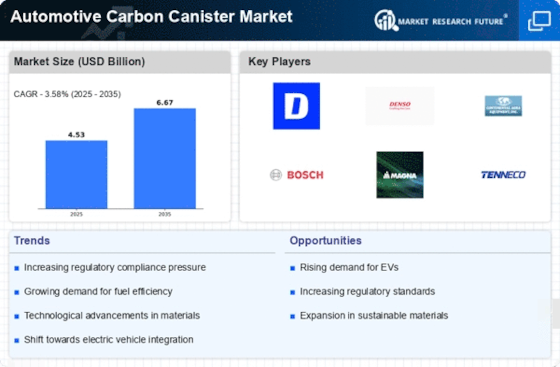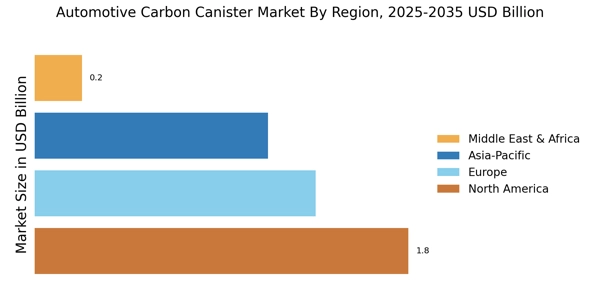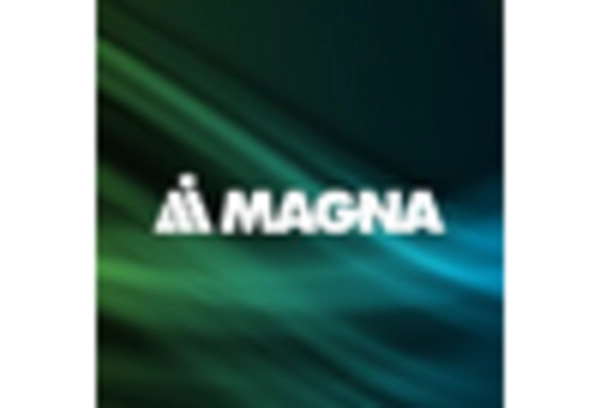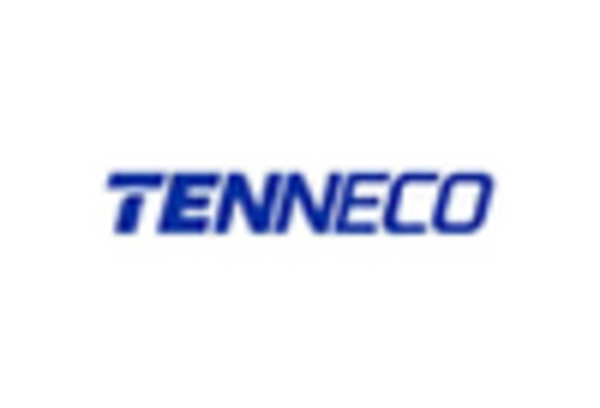Rising Demand for Fuel Efficiency
The Automotive Carbon Canister Market is significantly influenced by the growing consumer demand for fuel-efficient vehicles. As fuel prices fluctuate, consumers are increasingly seeking vehicles that offer better mileage and lower emissions. Carbon canisters play a crucial role in enhancing fuel efficiency by capturing fuel vapors and preventing them from escaping into the atmosphere. This not only helps in reducing emissions but also improves the overall performance of the vehicle. The market is likely to see a rise in demand as automakers focus on developing more fuel-efficient models, with projections indicating a compound annual growth rate (CAGR) of around 5% over the next five years.
Growth of the Automotive Aftermarket
The Automotive Carbon Canister Market is also experiencing growth due to the expansion of the automotive aftermarket. As vehicles age, the need for replacement parts, including carbon canisters, increases. This trend is particularly evident in regions with a high number of older vehicles still in operation. The aftermarket segment is projected to grow as consumers seek to maintain their vehicles for longer periods, thereby driving demand for replacement carbon canisters. In 2023, the aftermarket for automotive components was valued at approximately USD 400 billion, with carbon canisters representing a notable segment of this market. This trend indicates a robust opportunity for manufacturers and suppliers in the automotive carbon canister sector.
Increasing Environmental Regulations
The Automotive Carbon Canister Market is experiencing a surge in demand due to stringent environmental regulations imposed by various governments. These regulations aim to reduce volatile organic compounds (VOCs) emitted from vehicles, which has led to a heightened focus on carbon canisters. As a result, manufacturers are compelled to innovate and enhance their products to comply with these regulations. The market is projected to grow as more countries adopt similar standards, thereby increasing the need for effective emission control systems. In 2023, the market for automotive carbon canisters was valued at approximately USD 1.5 billion, and it is expected to expand as regulatory frameworks become more rigorous.
Shift Towards Sustainable Automotive Solutions
The Automotive Carbon Canister Market is witnessing a shift towards sustainable automotive solutions, driven by both consumer preferences and corporate responsibility initiatives. As awareness of environmental issues grows, consumers are increasingly favoring vehicles that incorporate eco-friendly technologies. Carbon canisters are integral to this shift, as they help in reducing harmful emissions and improving air quality. Automakers are responding by integrating advanced carbon canister systems into their vehicles, which is likely to enhance their market appeal. This trend is expected to continue, with projections indicating that the demand for sustainable automotive solutions will increase by approximately 10% annually, further propelling the growth of the automotive carbon canister market.
Technological Innovations in Automotive Design
The Automotive Carbon Canister Market is benefiting from ongoing technological innovations in automotive design. Advances in materials and manufacturing processes have led to the development of more efficient and durable carbon canisters. These innovations not only enhance the performance of the canisters but also contribute to the overall reduction of vehicle weight, which is a critical factor in modern automotive engineering. As manufacturers strive to meet consumer expectations for performance and sustainability, the integration of advanced technologies is expected to drive market growth. The introduction of lightweight materials could potentially reduce the weight of carbon canisters by up to 20%, thereby improving vehicle efficiency.

















